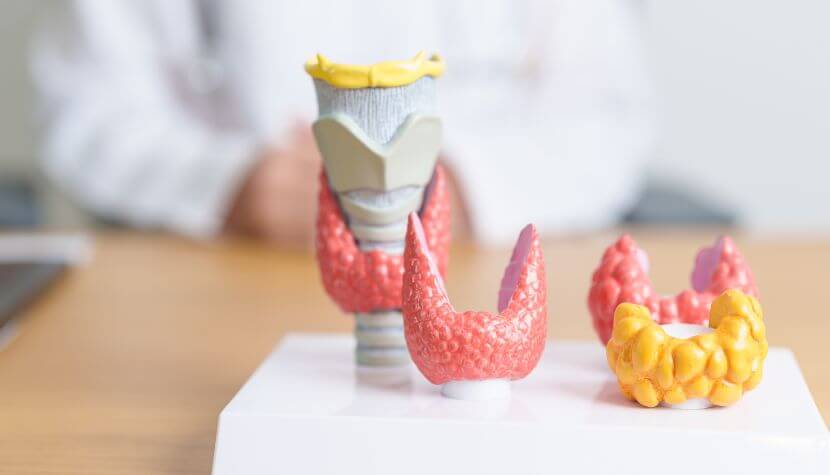
Struggling with some form of thyroid disease? You’re not alone. Thyroid disease impacts about 20 million people in the United States…but many don’t know they even have a disease. The two most common types of thyroid disease are hyperthyroidism and hypothyroidism. Both conditions can happen if your thyroid gland isn’t working as it normally should, but both are also very different. We’re here to break down the differences and educate on what signs and symptoms to look for. Like with most diseases and conditions, early detection is key. And with thyroid disease affecting your whole body, it’s important to get a diagnosis as early as possible.
First things first, what is the thyroid?
The thyroid is a butterfly-shaped gland that is located at the base of your neck and is part of the endocrine system that controls your body’s hormones. Thyroid hormones help metabolize fats, proteins, and carbs so you can use them for energy. They also help maintain blood pressure, body temp, and heart rate. Because the thyroid gland and its hormones impact so many systems in the body, a thyroid disorder can disrupt one’s health significantly.
What’s the difference between hyperthyroidism and hypothyroidism?
Hyperthyroidism is when you have an overactive thyroid, meaning it makes too much thyroid hormone. Hypothyroidism is when you have an underactive thyroid, meaning it does not make enough. Both hyper and hypo have different causes and symptoms, but sometimes the symptoms overlap. For instance, a goiter, or the enlargement of one’s thyroid, can happen in both conditions.
Symptoms of hyperthyroidism
Common signs and symptoms include:
- Hand tremor
- Weight loss
- Nervousness
- Fast heart rate
- Trouble sleeping
- Brittle skin
- Muscle weakness
- Irritability
- Weaker or less frequent periods
Graves’ disease, which is an autoimmune disease, is the most common cause. This means your immune system sees the thyroid as foreign and attacks, causing the thyroid to grow and release too many hormones. Other causes of hyperthyroidism include:
- Small masses within the thyroid
- Thyroiditis, or inflammation of the thyroid due to a virus
- Postpartum thyroiditis
- Intake of too much thyroid hormone
Symptoms of hypothyroidism
Common signs and symptoms include:
- Constipation
- Fatigue
- Cold sensitivity
- Weight gain
- Dry skin
- Forgetfulness
Hypothyroidism occurs when your thyroid is no longer working as well as it should, or it may happen if your thyroid is removed or destroyed for medical reasons (i.e., cancer). Hashimoto’s thyroiditis is another autoimmune disease and the most common cause of hypothyroidism in the United States. Other causes of hypothyroidism include:
- Previous radioiodine or surgical treatment of the thyroid
- Previous radiation for head and neck cancer
- Conditions that affect the pituitary gland in the brain (i.e., Sheehan’s syndrome)
- Congenital hypothyroidism (present at birth)
- Medications like amiodarone and lithium
What We Offer at CCP
The glands of the endocrine system may be small, but they have some big jobs to do to keep you healthy. The hormones created and released by the glands in your body’s endocrine system control nearly all the processes in your body. These chemicals help coordinate your body’s functions, from metabolism to growth and development, emotions, mood, sexual function, and even sleep. Regular check-ups, as well as special care (when necessary), will help you keep them balanced. Our endocrinologists at CCP provide comprehensive endocrinology care for adult patients with diabetes, metabolic disorders, thyroid disorders, pituitary disorders, adrenal disorders, and other endocrine-related disorders. Our endocrinology specialists are well-known in the patient and clinical communities, and we have convenient locations in the Capital Region. Our locations also offer additional on-site services, including medical imaging and lab, for your convenience. Symptoms tend to prompt people to see a doctor when it comes to thyroid disorders. So, if you require an endocrinologist, speak with your primary care provider or contact one of our offices.
